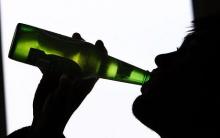We all get a little dumb after a few sips at the bottle. Anyone who's ever been drinking with coworkers can tell you that even the most typically composed, refined individuals turn silly while consuming their preferred poisons. Booze loosens us up in the head, for better or worse. It acts as social lubrication, allowing us to more freely chat with our companions and let our inhibitions slide away. It also acts as the ultimate stupefier, leading us to decisions that we may later seriously regret. People have known for centuries that alcohol enables you to do idiotic stuff. But researchers are just now figuring out the science behind the stupefaction.
Bruce Bartholow, an associate professor of psychology at the Missouri-Columbia College of Arts and Science, has been trying to figure out exactly what leads people to make decisions they otherwise wouldn't while under the influence of alcohol. His team has conducted a study wherein they measure the brain activity of participants while they complete a challenging task on a computer. The task was designed specifically to be too hard to do perfectly; the participants were supposed to screw up. The researchers also measured the subjects' mood and confidence in their ability to perform the assigned task. One third of the 67 participants were boozed up prior to the test, while the others were given a placebo or no beverage at all.
It turns out there's something an alarm signal that goes off in your brain when you do something wrong. If you're trying to complete a task and you fail, your brain reprimands you slightly, encouraging you to be more careful in the future. You probably know what that feels like, that "oops" rush, the slight frustration and embarrassment that accompanies it. When you're significantly intoxicated, though, you don't feel it at all. You might recognize an error, but the normal feelings surrounding it are absent. Bartholow's study found that the brain's alarm was quieted in the inebriated participants. When questioned, they acknowledged that they made a mistake, but they just didn't feel bad about it. They also didn't slow down their activity after being informed of their error; they knew they screwed up, but they just kept plowing through. They didn't care that they had messed up or that they might do so again in the future. They had no delusions about the quality of their performance; they just didn't care.
Sounds about accurate. People who drink often know they slip up, either physically or in conversation, but they just tend to feel better about it than the sober folk. If you were to trip and fall sober in front of a large group of people, you'd probably feel embarrassed. Your brain would fire off a signal telling you to cut it out and to be more careful. You'd experience a string of physiological effects from your mistake. But if you'd had a few shots and then fallen? You'd probably consider yourself hilarious, or at least get up and keep walking unperturbed.
Bartholow thinks that his findings may help people who suffer chronic anxiety: constantly blaring warning signals. The trick would be to harness the warning-quieting power of alcohol while keeping its adverse effects, like dependency and liver damage, to a minimum. But for the rest of us, Bartholow advises we keep our warning bells sounding strong--they help us to be careful and self-controlled in our everyday activities.
